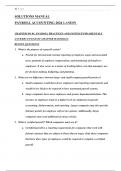Exam (elaborations)
Payroll Accounting 2024, 10th Edition, Landin (Solutions Manual for All Chapters)
- Course
- Institution
Solutions Manual For Payroll Accounting 2024, 10th Edition, Landin, Schirmer / Jeanette Landin 10th Edition Solutions For Payroll Accounting. Jeanette Landin, Paulette Schirmer, 9781264443468, Solutions Manual / Landin 10e Solutions, Schirmer 10e Solutions Manual Accounting.
[Show more]



